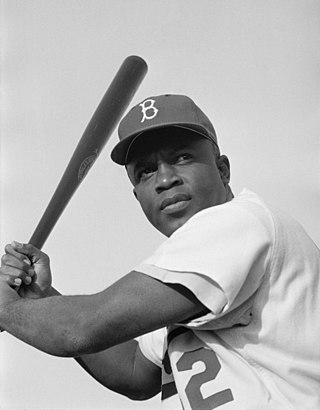
Jack Roosevelt Robinson was an American professional baseball player who became the first African American to play in Major League Baseball (MLB) in the modern era. Robinson broke the color line when he started at first base for the Brooklyn Dodgers on April 15, 1947. The Dodgers signing Robinson heralded the end of racial segregation in professional baseball that had relegated black players to the Negro leagues since the 1880s. Robinson was inducted into the Baseball Hall of Fame in 1962.

Wesley Branch Rickey was an American baseball player and sports executive. Rickey was instrumental in breaking Major League Baseball's color barrier by signing black player Jackie Robinson. He also created the framework for the modern minor league farm system, encouraged the Major Leagues to add new teams through his involvement in the proposed Continental League, and introduced the batting helmet. He was posthumously elected to the Baseball Hall of Fame in 1967.
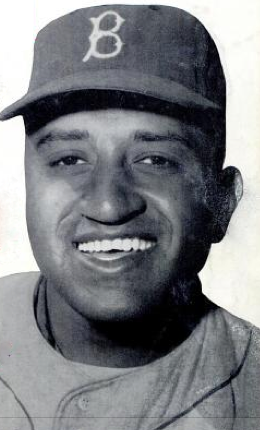
Donald Newcombe, nicknamed "Newk", was an American professional baseball pitcher who played ten non-consecutive seasons in Major League Baseball (MLB). He began his career in the Negro National League and ended it in Nippon Professional Baseball (NPB).
The Montreal Royals were a minor league professional baseball team in Montreal, Quebec, during 1897–1917 and 1928–1960. A member of the International League, the Royals were the top farm club of the Brooklyn Dodgers from 1939; pioneering African-American player Jackie Robinson was a member for the 1946 season. The 1946 Royals were recognized as one of the 100 greatest minor league teams of all time.

Walter Francis O'Malley was an American sports executive who owned the Brooklyn / Los Angeles Dodgers team in Major League Baseball from 1950 to 1979. In 1958, as owner of the Dodgers, he brought major league baseball to the West Coast, moving the Dodgers from Brooklyn to Los Angeles despite the Dodgers being the second most profitable team in baseball from 1946 to 1956, and coordinating the move of the New York Giants to San Francisco at a time when there were no teams west of Kansas City, Missouri. In 2008, O'Malley was elected to the National Baseball Hall of Fame for his contributions to and influence on the game of baseball.

Fred E. "Dixie" Walker was an American professional baseball player, coach, scout and minor league manager. He played as a right fielder in Major League Baseball from 1931 to 1949. Although Walker was a five-time All-Star selection, and won a National League batting championship (1944) as well as an RBI championship (1945) as a member of the Brooklyn Dodgers, his accomplishments as a player were overshadowed by his attempt to keep Jackie Robinson from joining the Dodgers in 1947. He also played for the New York Yankees, Chicago White Sox, Detroit Tigers and Pittsburgh Pirates.
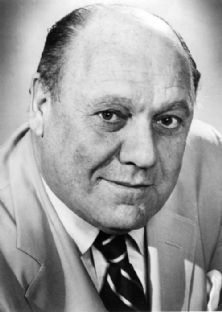
Emil Joseph "Buzzie" Bavasi was an American executive in Major League Baseball who played a major role in the operation of three California baseball franchises from the late 1940s through the mid-1980s.

Clyde Leroy Sukeforth, nicknamed "Sukey", was an American baseball catcher, coach, scout and manager. He was best known for scouting and signing Jackie Robinson, the first black player in the modern era of Major League Baseball (MLB), to the Brooklyn Dodgers, after Robinson was scouted by Tom Greenwade in the Negro leagues. He was also instrumental in scouting and acquiring Roberto Clemente for the Pittsburgh Pirates.

Charles Walter Dressen was an American third baseman, manager and coach in professional baseball during a career lasting almost fifty years. He is best known as the manager of the Brooklyn Dodgers from 1951 to 1953, where he won two National League pennants. Indeed, Dressen's "schooling" of a young baseball writer is one of the most colorful themes in Roger Kahn's classic 1972 memoir, The Boys of Summer. He threw and batted right-handed and was listed at 5 feet 5 inches (1.65 m) tall and 145 pounds (66 kg) during his days as an active player.

Burton Edwin Shotton was an American player, manager, coach and scout in Major League Baseball. As manager of the Brooklyn Dodgers, he won two National League pennants and served as Jackie Robinson's first permanent Major League manager.

Ralph Theodore Joseph Branca, nicknamed "Hawk", was an American professional baseball pitcher who played 12 seasons in Major League Baseball (MLB), from 1944 through 1956. Branca played for the Brooklyn Dodgers, Detroit Tigers (1953–1954), and New York Yankees (1954). He was a three-time All-Star. In a 1951 playoff, Branca surrendered a walk-off home run to Bobby Thomson of the New York Giants; the game-winning hit was known as the "Shot Heard 'Round the World".

In baseball, the "Shot Heard 'Round the World" was a walk-off home run hit by New York Giants outfielder and third baseman Bobby Thomson off Brooklyn Dodgers pitcher Ralph Branca at the Polo Grounds in New York City on October 3, 1951, to win the National League (NL) pennant. Thomson's dramatic three-run homer came in the ninth inning of the decisive third game of a three-game playoff for the pennant in which the Giants trailed 4–1 entering the ninth and 4–2 with two runners on base at the time of Thomson's at-bat.

Robert Randall Bragan was an American shortstop, catcher, manager, and coach in Major League Baseball and an influential minor league executive. His professional baseball career encompassed 73 years, from his first season as a player in the Class D Alabama–Florida League in 1937, to 2009, the last full year of his life, when he was still listed as a consultant to the Texas Rangers' organization.
The Nashua Dodgers was a farm club of the Brooklyn Dodgers, operating in the class-B New England League between 1946 and 1949. It is believed to be the first professional baseball team based in the United States in the twentieth century to play with a racially integrated roster. The team was based at Holman Stadium in Nashua, New Hampshire.
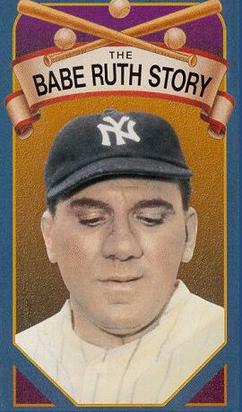
The Babe Ruth Story is a 1948 American biographical film about professional baseball player Babe Ruth (1895–1948), who achieved fame as a slugging outfielder for the New York Yankees. Directed by Roy Del Ruth, the film stars William Bendix as the ballplayer and Claire Trevor as his wife Claire Merritt Hodgson. The film initially received positive reviews, however, modern-day critics faulted the film's heavy-handedness and direction, and it is said by many to be one of the worst films ever made.

Homer Elliot "Dixie" Howell was an American professional baseball catcher. He appeared in eight seasons in Major League Baseball (MLB) between 1947 and 1956 for the Pittsburgh Pirates, Cincinnati Reds and Brooklyn Dodgers.
On April 15, Jackie Robinson was the opening day first baseman for the Brooklyn Dodgers, becoming the first black player in Major League Baseball. Robinson went on to bat .297, score 125 runs, steal 29 bases and win Major League Baseball's inaugural Rookie of the Year award. The Dodgers won the National League title and went on to lose to the New York Yankees in the World Series. This season was dramatized in the movie 42.

John Richard Wright was a Negro league pitcher who played briefly in the International League of baseball's minor leagues in 1946, and was on the roster of the Montreal Royals at the same time as Jackie Robinson, making him a plausible candidate to have broken the baseball color barrier. Instead, Wright was demoted from Montreal and returned the next season to the Negro leagues.

42 is a 2013 American biographical sports film about baseball player Jackie Robinson, the first black athlete to play in Major League Baseball (MLB) during the modern era. Written and directed by Brian Helgeland, the film stars Chadwick Boseman as Robinson, alongside Harrison Ford, Nicole Beharie, Christopher Meloni, André Holland, Lucas Black, Hamish Linklater, and Ryan Merriman in supporting roles. The title of the film is a reference to Robinson's jersey number, which was universally retired across all MLB teams in 1997.
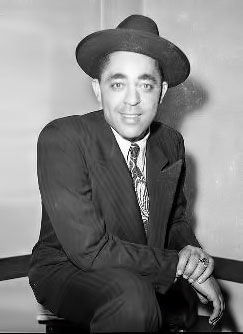
John Wendell Smith was an American sportswriter and civil rights activist who was influential in the choice of Jackie Robinson's career as the first African American Major League Baseball player. Similarly, Smith was one of the first African American sport-writers to be a member of the Baseball Writers' Association of America, and was posthumously awarded the J. G. Taylor Spink Award by the Baseball Hall of Fame in 1993.



















